|
|

 New England's first "Separatist" colony: The Plymouth Plantation (1620s) New England's first "Separatist" colony: The Plymouth Plantation (1620s) It becomes time for even the Puritans to "separate" (1630s) It becomes time for even the Puritans to "separate" (1630s)  John Winthrop – America’s First "Founding Father" John Winthrop – America’s First "Founding Father"  Puritan life Puritan life  Voices of dissent Voices of dissent  Relations with the Indians Relations with the Indians The textual material on this webpage is drawn directly from my work America - The Covenant Nation © 2021, Volume One, pages 52-71. |

A Timeline of Major Events during this period






|

|
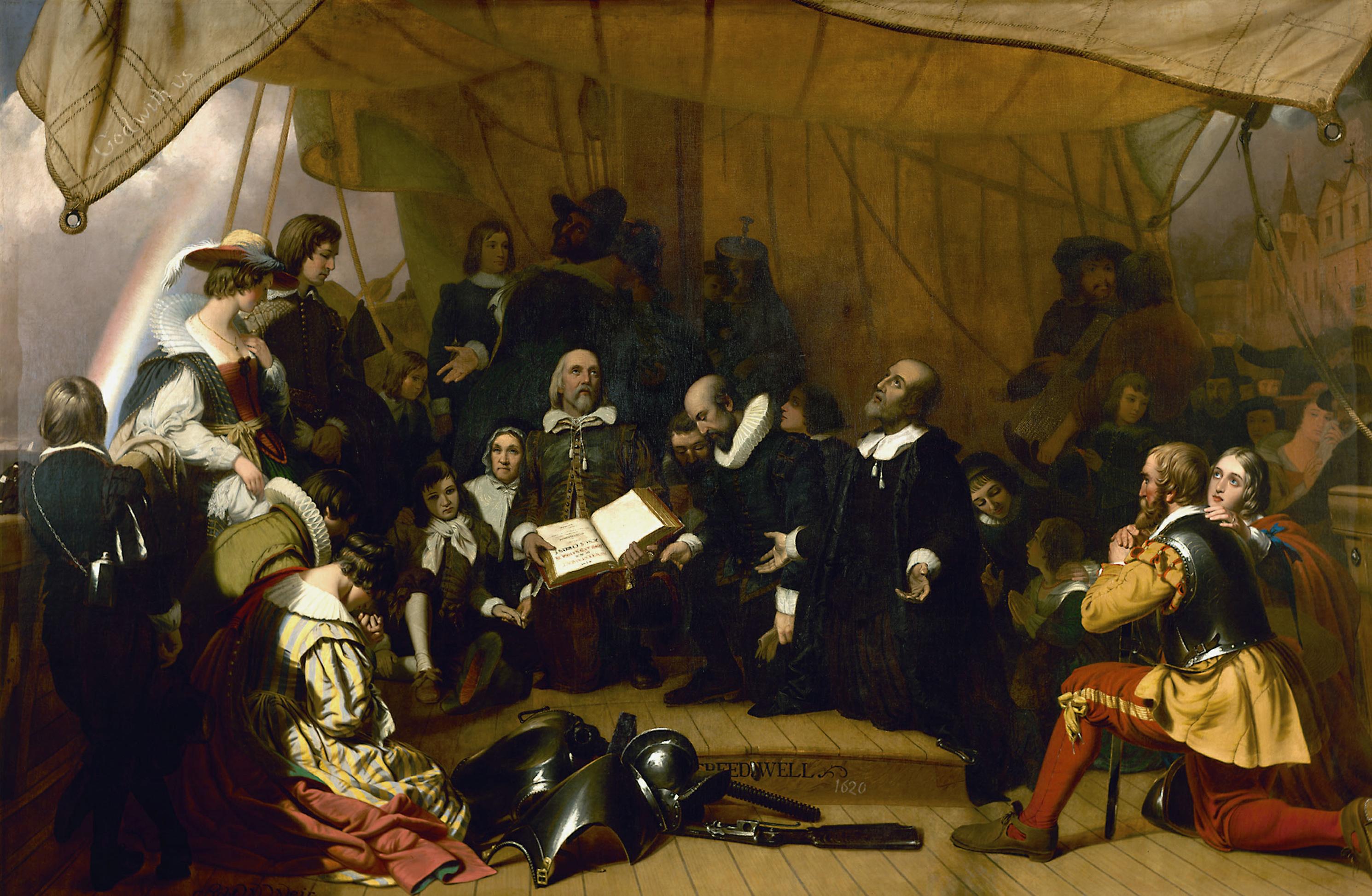
United States Capitol Art
Collection - Architect of the Capitol
|
Strongly Differing Motivations
for the Virginia and New England Colonies Just as the Virginia colony was basically established for economic reasons, the Puritan colonies of New England were established for religious reasons. The latter is harder to understand today because in our increasingly secular culture, religion seemingly plays such a small role in our lives – or for many, apparently none at all. It is also easy to understand the Virginians' desire to found a colony where they might secure for themselves material wealth and high social status. That is what basically drives modern society. It is not so easy for us to understand the Puritans' desire to found a colony where they might secure for themselves God's pleasure and his blessings. But indeed that was the case – very much the case. In short, those two different motivations, wealth/status and religion/purity were basically the source of the major differences between the two colonies. Everything about them followed naturally from these original motivations – one economic, one religious.
A Split in England's Protestant Ranks:
Puritans and Separatists It is important to point out that even within the ranks of the English Protestant reformers there was a split. The vast majority of the reformers remained loyal to the Church of England – hoping to bring it to Puritan standards. But other reformers took the attitude that reforming the English church was impossible and that the true purists should simply separate from the Church of England and go their own way. Most of the Puritans disagreed strongly with those they called "Separatists," seeing their giving up on church reform as betrayal in the face of the great task of church reform. Though these two groups of English Protestants never came to blows, certainly the Puritans looked down upon the Separatists as being something like traitors to the Protestant cause.
The Separatist Pilgrims Arrive First in New England (1620)
With Queen Elizabeth's death in 1603, her cousin and Scottish king James received the crown of England (thus becoming king of both England and Scotland). We have already noted that he fully intended to keep England in the Protestant camp. But loving the privileges of power, he strongly resented mere commoners telling him how to run the Church of England. The Puritans annoyed him greatly – though he tolerated them. But for the Separatists he had no toleration whatsoever and treated them as English traitors. His persecution of the Separatists was intense, even murderous. Finally, a group of Separatists managed to escape England in 1608-1609 to the city of Leiden in the land of the Dutch Protestants – where a version of Calvinist Protestantism similar to their own was widely practiced. But job opportunities, especially for rural English in a highly urbanized Leiden, were few. Most of the Separatists faced long hours of work at menial tasks. Also, with the Catholic Spanish trying to bring the Protestant Dutch to their knees, it was an exceptionally difficult time for anyone then living in the Netherlands. And with time, these English ex-patriots sensed that they were losing their English identities, especially among their children, who were taking up Dutch ways. Leiden was not the solution to their problems that they had hoped it would be. Within ten years they knew they had to move on – most likely to the wilderness of America – despite the stories coming from America about the hostile Indians and massive deaths of the colonists in Virginia. But securing the right to emigrate to America was extremely complicated and proved to be loaded with deceptions that were foisted on the Leiden community. At the same time, English Royalist pressure on the Dutch authorities to squeeze out the Separatists was heightening. Ultimately however the Separatists received permission to settle in the area around today's Hudson River by a newly formed Plymouth Council for New England, itself desperate to find individuals willing to take on the huge risks of settling in their colony. In September of 1620, 102 of the Leiden Separatists finally were able (after a couple of major mishaps) to put Europe behind them and head toward America. They arrived in America two months later – not at the Hudson River area they were assigned to settle, but well to the north at Cape Cod. November weather and countering winds moving north up the American coast – which they could not sail against – consequently forced them to settle in there at the Cape.
There were no gentlemen among them who might be expected to take command of the enterprise. They were all simple commoners. There was therefore no typical English political order within their community. They would have to devise such a thing themselves. So they created their own social contract, the Mayflower Compact, by which, still aboard their ship Mayflower, they agreed to form their own political community at Cape Cod – complete with their own rules of government, which they all agreed to respect. They were following a format modeled on the church covenants that were used typically in the formation of new congregations by the members themselves (a common practice among Separatists). William Bradford (one of the colony's frequently elected governors) recorded the Compact as reading: In the name of God, Amen. We whose names are underwritten, the loyal subjects of our dread Sovereign Lord King James, by the Grace of God of Great Britain, France and Ireland, King, Defender of the Faith, etc.They thus vowed to form a tightly-knit community rather than just a collection of self-interested individuals. This would be a quite different venture than the one in Virginia.
Settling in at Plymouth (1621)
It was a most unfortunate time for arrival, for winter was beginning to set in. They were also positioned at a point along the New England coast where mistreatment of the Indians by earlier English adventurers had left the Indians potentially very hostile. But smallpox had cleared some of the area of its Indian inhabitants. After three weeks of exploring the area, they found an excellent fresh-water site inside the Cape to lay the foundations for their settlement or plantation, which they called Plymouth. But it was now late December and winter had set in on them. They needed to erect buildings for shelter as quickly as possible to get the people out of the damp conditions aboard the Mayflower. It was a very hard time. Tragically a main building they had just built, one which they hoped could then shelter them, burned badly in mid-January. At this point they began to die, losing around half of their members over that winter of 1620-1621. Of the eighteen wives in the group, fourteen died that winter. The children and youth fared better than their parents, but consequently their numbers now included a large group of parentless orphans. But amazingly as the spring approached, their fortunes changed dramatically. Not one but two Indians able to speak English presented themselves to help them adjust to life in the New World! One in particular, Squanto, would be a Godsend, showing them how to plant and cultivate the corn that would become their life support. And both Indians would introduce them to the Indian chief of the area, Massasoit, whose Wampanoag tribe would become close allies of these English. The summer yielded a fair crop. Their homes were in place. Yes, they had paid a huge price for their success, having lost half of their members during the terrible winter. Yet though they certainly mourned for lost loved-ones their hearts were glad enough to schedule a harvest feast, to which they invited their Indian friends, in recognizing that God had performed a miracle among them. Their community definitely was well planted and able to survive. They had succeeded against all odds. Now they could expect to live in a world that existed to give God great glory through their human enterprise. Here, as unlike in England, they could live freely to the Christian goals and standards they long had sought. And unlike Virginia, which went continuously through the hardest of times, these Pilgrims at Plymouth would never again experience the kinds of catastrophes encountered in Virginia. They would face another winter of hardship that very next year when a boatload of more colonists was unloaded at their doorstep. But even then, there would be no dying time – because they all sacrificed together to get everyone through that winter. And their relations with the Indians remained generally friendly (especially their alliance with Massasoit) – unlike Virginia. Then over the next years, the bringing of more settlers (not a large number however) to the area was a regular event. By 1630 there were 300 people living in the Plymouth colony. Their community had survived and prospered all because (as they saw it) they had been willing to live like true Christians.1 Also ironic and sad is that everything that the Pilgrims were ready to sacrifice for is completely ignored by modern secular society, even as it celebrates the remarkable achievement of this early group of English settlers. The Pilgrims' motives for this dangerous enterprise are recast by modern Secularists (or Humanists) as simply the quest for freedom. The quest for religious purity is not something that Secularists are either able or willing to acknowledge as the prime reason for the Pilgrims' undertaking of this dangerous enterprise. 1
The
Pilgrims actually regarded very humbly their own efforts at settlement.
They sacrificed most of their earnings to pay off greedy investors back
in London – who kept upping the obligations imposed on them. Their
children would later drift away to settle in more fertile parts of New
England, leaving the legacy at Plymouth somewhat forlorn in comparison
to the thriving settlements to the north around Boston. They would have
been totally surprised to know that today they are the most celebrated
of all people who made the perilous journey to English America – to
bring the Christian life to the New World. |
Library of
Congress
The pilgrims' landing (actually considerable exploration by search parties
occurred before families left the Mayflower)
Pilgrim Hall
Stedelijk Museum De
Lakenhal
New York Historical
Society

|
|
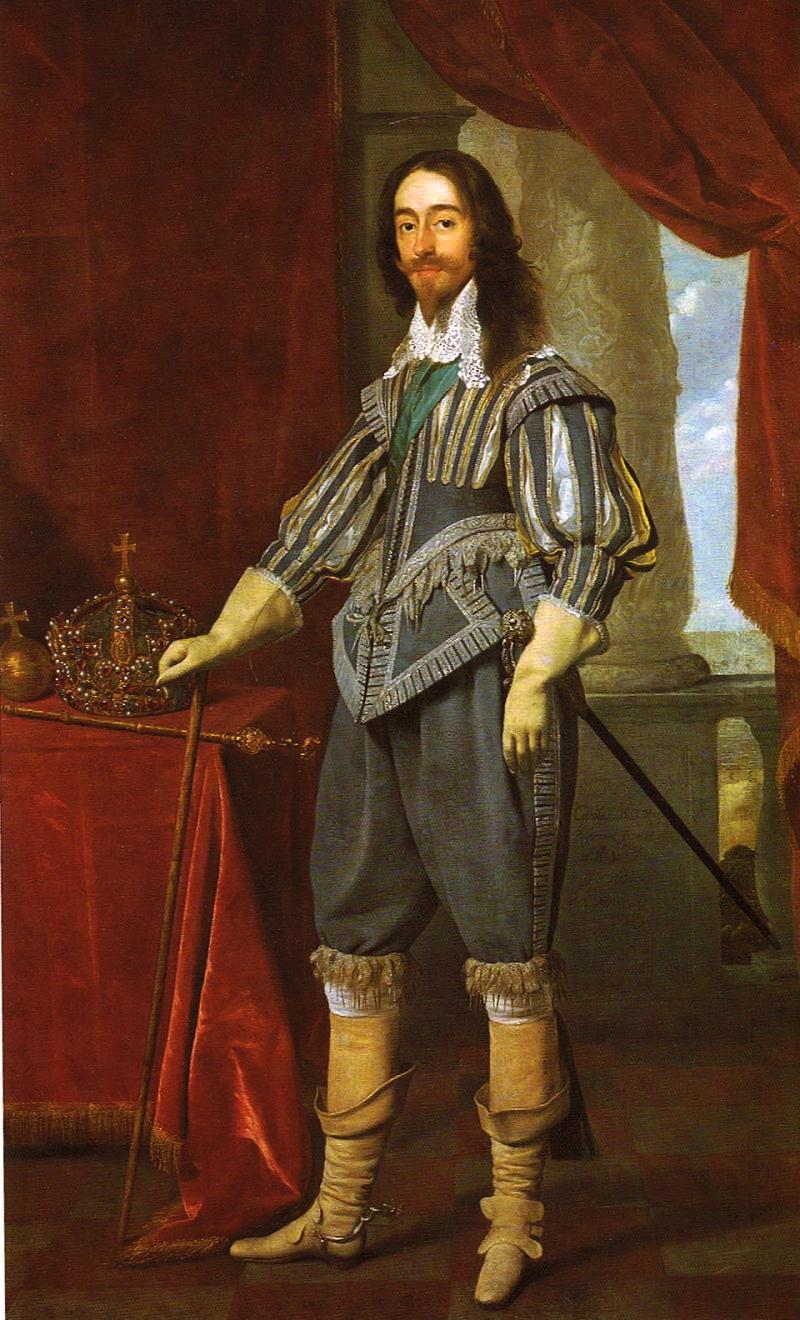
John Endecott – Governor of the earliest Puritan colony at Salem in Massachusetts
Some of the ships John Winthrop
brought to New England, anchored in Boston harbor – 1630
by William F.
Halsall
Winthrop and company arrive at Massachusetts
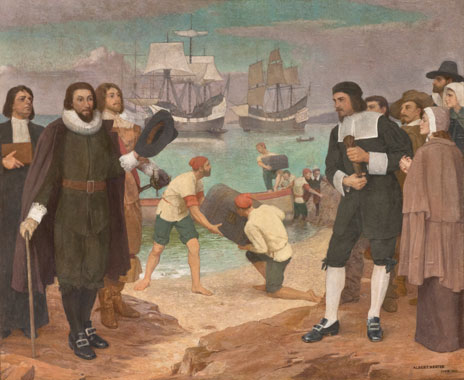
Another portrayal of the same event

|
American Antiquarian
Society
| Far
above all others, John Winthrop was the one who directed the course of
Puritan New England to its success as a grand religious or social
experiment. It was Winthrop's sense of vision, his optimism, that kept
New England on course as it laid out a Godly society built from the
ground up in such a way that it could serve God as a City on a Hill, a
beacon light to all the world. It was Winthrop's background and
personality that helped steer the course of this development between
the dangerous rocks of religious fanaticism on the one hand and
heavy-handed legalism on the other.
Winthrop was nobly born to a father who was both a lawyer and substantial landowner as well as a director at Trinity College, Cambridge – which John himself would attend, and there develop close friendships with other Puritan reformers. At age twenty-six his father made John Lord of the Manor at Groton and then later a member of his law firm in London. John was profoundly religious – his long-developed journal describing the struggles he had in attempting to live worthily as a Christian, and his constant appeals to God's grace to give him the power to live with a spirit of joy, despite the many challenges he faced in both his private and public life. Those challenges included the deaths of his first two wives, and the gradual pressure put on the Puritans by King Charles and his chief advisor, Archbishop Laud. The latter challenge became particularly troublesome when in 1629 the king dismissed Parliament – fully intending to rule England on his own as absolute sovereign – and dismissed Puritans from public service, including Winthrop, who lost his position at Court. But this freed up Winthrop to spend his time in the autumn of 1629 trying to convince the newly formed Massachusetts Bay Company of the importance of a general emigration of Puritans to New England. At a Company shareholders' meeting in October the decision was made to take Winthrop's advice, and, as he was willing himself to make the journey with the first group of emigrants, he was chosen to serve as the Company's governor.3 Winthrop then organized the effort to arrange for a fleet of ships and supplies necessary to carry out this journey to America. He also was active in recruiting pastors who would be needed to guide the communities that the Company intended to set up upon arrival at their new home in America. Winthrop could be a tough governor, and he made mistakes, which he freely acknowledged, mistakes which made his heart all the more supple and which drove him to depend ever more completely on the mercies of God rather than on his own sense of right-mindedness to keep things moving forward. He had his detractors, even dedicated enemies, who felt that his hand was too strong – or not strong enough. But his love for his fellow New Englanders was immense – as was their love for him. And it was this love, more than anything else, that gave the New England experiment its strong foundations. Establishing a viable community in the New World meant having to build on new and untested social principles – where only old English social habits, plus a lot of expectations for a radically new society, had to be carefully reshaped and redirected so as to produce something socially viable in the New World. All of this had to take place in the context of a heated debate raging among Englishmen about proper or Godly social ideals, and more particularly, proper or Godly social authority. By tradition the English were very deferential to the authority of their social "betters," unquestioned social authority typically being bestowed on those favored by upper class birth. Thus in one sense it was expected that those of higher social rank would naturally direct the development of colonial society. In New England all these social-political ideas and attitudes would come together in tension. Thus Winthrop (and his associates) had to carefully guide this new society through these challenging times in order to develop this new society on firm social and political ground. Winthrop addressed this matter from the very outset by setting an example personally in undertaking hard physical labor to get housing established for the Puritan settlers in a number of different settlements in what would become the Boston area. He made the message very clear: everyone was expected to labor in God's vineyard. There would be no exceptions, not even for gentry. Hard work was expected of everyone despite whatever social rank they had back in England, work that not only served to get the colony established on solid ground but which also made it clear that there would be no traditional English social ranking in New England. Here all were equal by birth in the eyes of God, and thus they would also be equally born in the eyes of man. The only social rewards to be achieved in New England would be the product of one's own labor. And even these were to be kept within a sense of the fundamental equality, and thus unity, of New England society. That included housing, clothing, and any other visible markings that back in England were designed to announce clearly one's status. An example of how serious Winthrop took this matter would be the fuss that Winthrop made with his deputy Dudley because Dudley had built his house with excessive decorative woodwork!
The Larger Legacy of This Puritan Venture
Today the Puritan experiment is treated as if it were some kind of terrible period of religious bigotry in American history.4 Little is taught and therefore little is remembered about those early formative days except a few unflattering episodes selected from the long and complex history of the period, episodes that shed little light on the actual dynamics of the times but instead episodes that point more to the kinds of social priorities that have emerged in post-modern America. On the one hand, the dissenters of those early years who attacked the moral and political authority of the colony are today held up as the true heroes of early America. On the other hand, forgotten are those that labored hard to keep the society united and moving together against all the forces which threatened to pull that precious social order apart. The name John Winthrop is barely known today. This is very unfortunate for there are great lessons to be learned from how democracy in America was crafted out of a carefully cultivated spirit of compromise, one which set careful boundaries to political discourse so that tempers and egos of the more energetic type might not wreck the society. Yet it was a system which allowed within those boundaries a wide latitude of freedom of discussion and debate, something that was unheard of in those times. Indeed, such a spirit we would be most unwise not to continue to respect, study, and nurture with the same care by which it was first developed. For the blessing of so great a social legacy as this home-grown American democracy we may thank God – and certainly also to a very great extent his humble servant John Winthrop, the first of America's great Founding Fathers. 3Between his election as the Company's governor in 1629 and his death in 1649, Winthrop was for 19 of those years elected annually as either the Company's governor or its deputy governor. 4Very characteristic of how modern America has come to view the entire
Puritan enterprise is the way it is summed up in a very popular
textbook used recently in America's public schools – to teach a rising
generation about its cultural-moral inheritance: Ira Peck and Steven
Deyle's American Adventures: People Making History (New York: Scholastic Inc., 1991). |
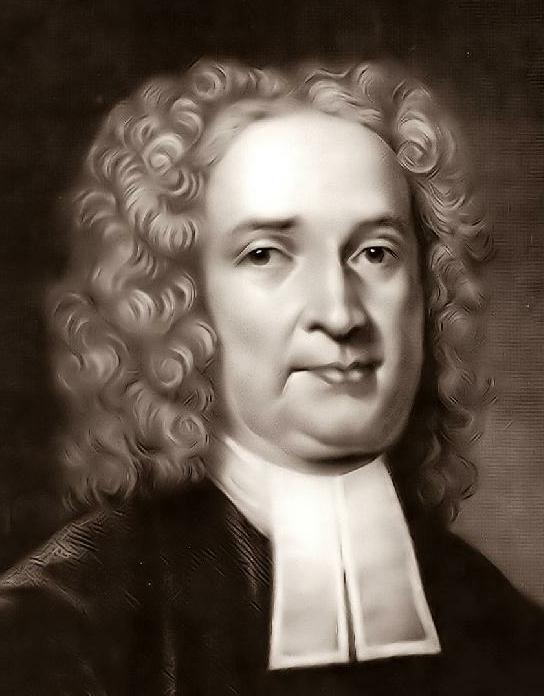
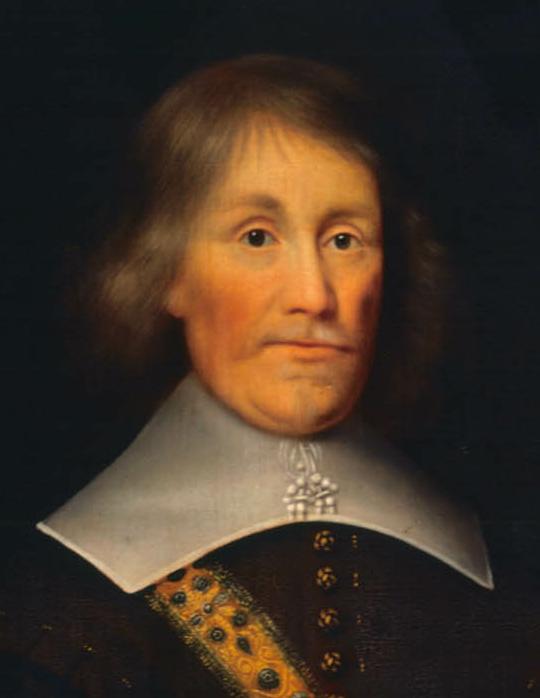

Some Puritan fathers: John Cotton (left), Richard Saltonstall (center), and Josiah Winslow (right)
Winthrop and his assistant Dudley having a disagreement

|
Puritan worship – Watertown, Massachusetts
|
The Early Development of New England
There was nothing attractive about New England for those of any aristocratic nature or ambition, for New England offered no known opportunity for striking it rich. Only those who were content to live merely comfortable – yet free – lives were attracted to the colony. This resulted in a high degree of sense of basic equality within the society. Besides, basic Puritan theology stressed how all people were equal in the eyes of God – and anything otherwise was just sinful vanity. And thus it was that Middle-Class America was born!
Property Rights as the Foundation of Puritan Economic Equality
Property ownership was an important consideration in Puritan society (as it was of course also in feudal society), but only as an assurance that the citizen as property-owner would have a stable or conservative interest in the welfare of the society. And property was fairly abundant in New England (at the great cost, of course, to the Indians). In fact, there was much attention given to the matter of property by the Massachusetts authorities. Each village or town was understood to have just so much property to offer to newcomers, most of it offered on a fairly equitable basis. When that property was fully distributed, a new town (usually west, towards the expanding frontier) would be opened up for settlement and the property there carefully distributed to a new group of settlers. While this offered no one any opportunity for great wealth, it also offered no urban overcrowding and no poverty such as existed widely back in England.
New England Government
The matter of the government of Massachusetts went through a difficult process of evolution within those same years. At the outset (1630) the colony was under the authority of the Company – which was directed by the Governor and a Council of eight freemen. But under pressure from some of the settlers, the Council expanded membership on a General Court to include 118 of the men, although the Council still continued to conduct most of the colony's business. When a special tax was levied on the colony in 1632 complaints were quick to arise. In 1634 the settlers discovered that the Company's charter actually had provided for the General Court to be made up of all the freemen. But as the colony had become by this time so enormous, that was not a practical possibility. A compromise was reached in the form of representation to the General Court by two members elected by each town – plus the Governor and the members of the Council. The colony now had its own legislature. The General Court not only voted taxes and other matters of general concern of the colony, it took up the responsibility of electing the Governor. It also promulgated a new code of laws, the Massachusetts Body of Liberties (1641) which guaranteed a number of personal rights to, but also the duties of, the colony's citizens. Thus it was that a commercial corporation became a representative democracy of its own design.
The New England Confederation
Two years later (1643) the colonies of Massachusetts, Plymouth, Connecticut and New Haven (excluding Williams' Rhode Island, which did not participate) joined together to form the New England Confederation, primarily to unite their defense efforts against the restless Indians – and also against the expansive French and Dutch. But it also coordinated their jurisdictions so that a person could not avoid the effects of law by simply escaping to another of these colonies. And it provided a mechanism for resolving disputes among the colonies – each colony, regardless of size, possessing two votes each on an issue. Thus even though the civil authorities back in England had made no particular provision for the English colonies to work together, the colonies had taken the initiative on their own to meet this need. This inter-colony cooperation would become an important part of the development of English America. But that was because they were all very aware of the dangers of not working closely together as a new society. The dangers of failure were a clear and present danger to the colonists. The examples of the failure of efforts to settle the New World were numerous and horrible to behold. And thus the need to work closely together was understood by all. |
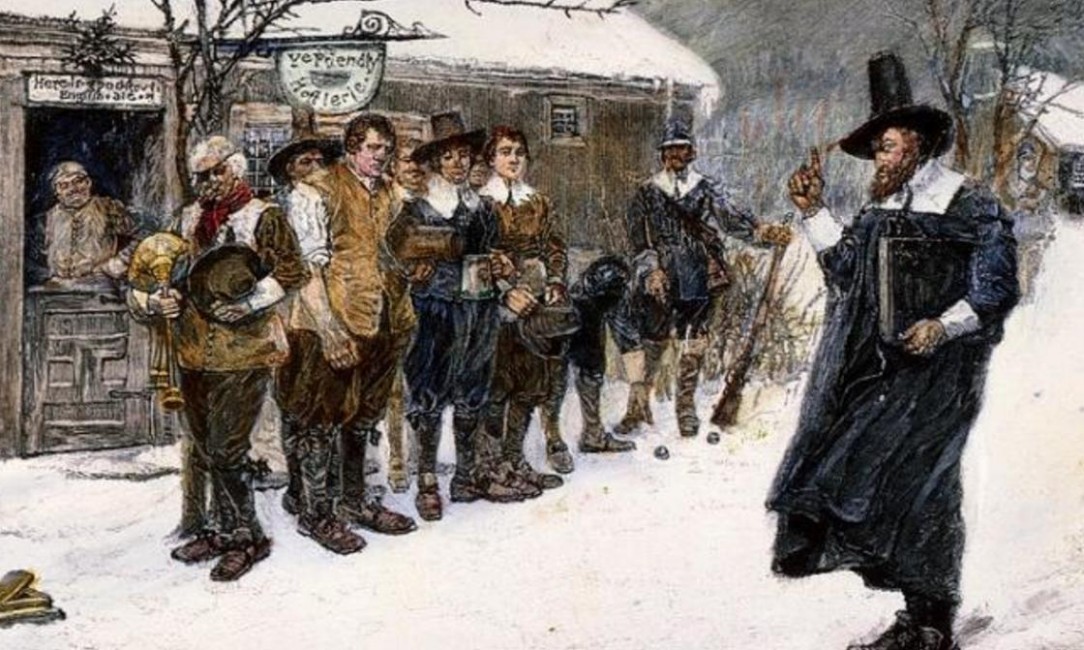
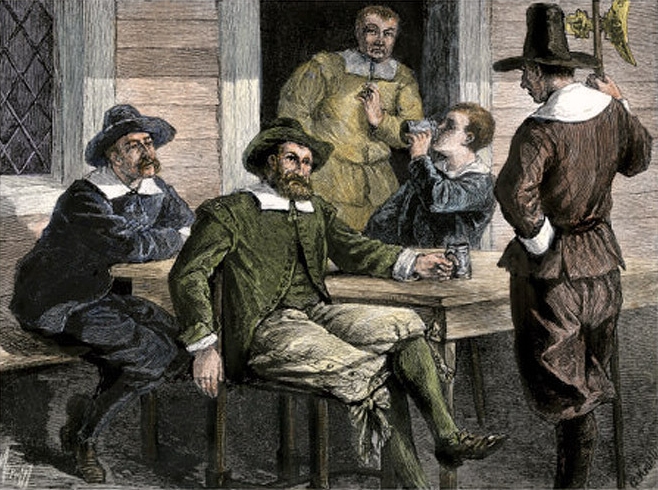
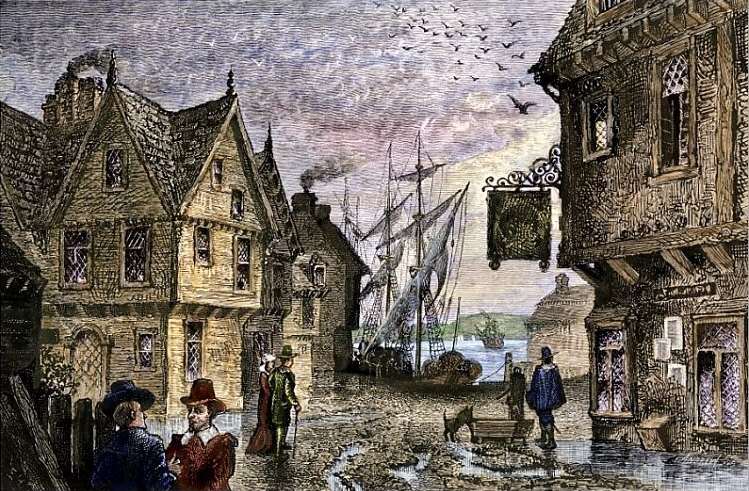
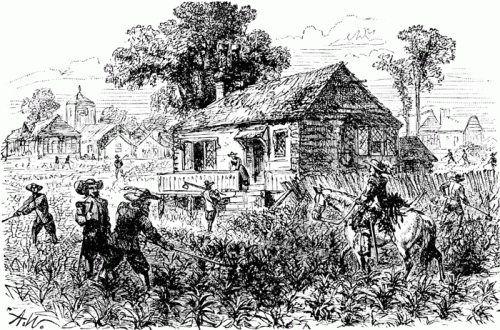
|
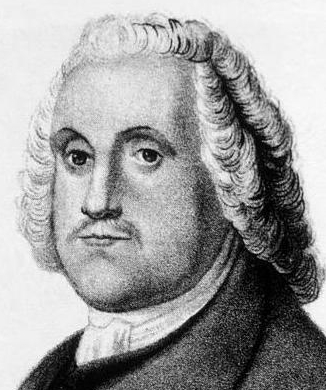
Roger Williams - arrived at Massachusetts and assigned several pulpits
but could never find the purity he sought in the colony
and was thus forced to start up his own "Providence" colony in 1635-1636
| Almost
all, that is. There were some notable exceptions. Not all of the
Puritan settlers were content with the social order in Massachusetts
that was quickly taking shape under Winthrop and the other Puritan
leaders (mostly pastors of this or that community that dotted the
landscape). As is typical of any society, there were critics or
dissenters, who for one reason or another found the setup to be not to
their liking. As previously noted, today it is these dissenters, not
the ones attempting to preserve a viable social order, who have drawn
the greatest notice and admiration of modern historians (especially of
the revisionist school of history), who find much about the Puritans'
demand for unity to be horribly contradictory to their highly
cultivated sense of personal freedom.
Roger Williams and the Providence Colony
One of these dissenters was Roger Williams, a supremely intelligent and personable young man, who came to the colony in 1631 and was immediately offered the pulpit of the Boston church. But he was a compulsive perfectionist, unable to locate the perfection he always hungered for, thus finding himself to be a tormented soul under the control of personal instincts that made him an early version of the self-destructive Humanist (in other words, an individual unable to accept the fact that realistically the world will always be full of sinners, no matter how hard you try to rewrite the rules of life). Thus he declined the Boston pulpit – because he felt the church not to be pure enough (it included members who had participated in a Church of England communion service and had failed to repent of this great sin). He accepted the pulpit in Plymouth, but eventually found the church there also not pure enough. He switched to the pulpit in Salem, and from there began a wider quest for purity within the larger Massachusetts colony, particularly over the matter of the very right of the colony to exist at all. His major concern, one that he harped on most loudly, was about the illegitimacy of the charter that authorized the Massachusetts Company to be about its business in America. The charter had come from the English king, not the Indians, the only ones who, according to Williams, had the right to issue such permission. Also behind his dissent was his strong Puritan belief that no one but God alone truly knew who was saved and who was not. Therefore no one had the right to qualify who had, and who had not, the right to participate (vote) in the political affairs of the community. But since being demonstrably among the saved was key in the Bay Colony's qualification permitting a person full membership in the church and thus also the right to lead (vote) in the affairs of the colony, Williams' theology undercut the entire vision of legitimacy that the Bay colony was trying to build itself on. His criticisms soon started fraying the nerves of the colony's leaders, who tried to get him to understand how harmful to the spirit of unity of the community his attacks were becoming. Being reprimanded by the Council for his trouble-making, he quieted down for a while. But then he soon started back up again. His attacks on the colony for having received their grant from the king without the assent of the local Indians the Council knew would prove highly offensive to the king should he get wind of Williams' tirades. The whole venture could be compromised by Williams' attacks. He was called a second time (summer of 1635) before the Council for his trouble-making. An impasse developed between the Council and Williams: banishment was finally ordered (October) – but postponed because of the arrival of winter, provided that he stopped his attacks on the colony's authorities ... which he seemed unable to do. Thus about to be expelled, he and a group of followers left the colony (January 1636), taking refuge among the Wampanoag Indians. In the spring, having purchased land from the Narragansett Indians, he founded his Providence Colony (in the future Rhode Island) where he could put his purer social ideas into play. In accordance with his own fundamental principles, he opened up his colony to full (male) political participation by anyone, regardless of particular religious persuasion. Thus Anabaptists (Baptists) joined his colony. These he joined, for a few months anyway – until he found problems with this group of Baptists as well. Then to find refuge in Williams' colony came the hyper-activist Quakers,5 whose most unusual theological ideas and behavior were highly contradictory to the fundamental principles of the Bay colony. Williams personally disliked (and debated) Quaker theology. But he nonetheless permitted them to stay. However his colony also became a natural attraction for all the ruffians and malcontents who found the discipline of the Bay Colony not to their liking. Ironically, these newcomers who would soon have the opportunity to quote some of Williams' own earlier sermons, enjoyed denouncing him as a hypocrite when he himself attempted to force some kind of social discipline on his colony! And oddly enough, several years later he returned to England – to get a charter from Parliament authorizing his new colony of Providence, the very thing that he had been loudest about in his critique of the Bay Colony's legitimacy! Eventually Williams discovered that grace rather than self-righteousness was the greater Christian virtue. A close friendship he continued to maintain with Winthrop during the difficult startup years of his new colony only deepened with time. And his concern for the Indians proved authentic. And in the end, this spared the Providence colony some of the Indian troubles which would later hit New England. 5The more typical image held of the Quakers today is their quiet manner and spiritual gentleness. But in their early stages of existence (the mid–1600s) they were loud, abrasive, even lewd in their rather violent demonstrations against Puritan piety. The quietist image will not develop until much later. |
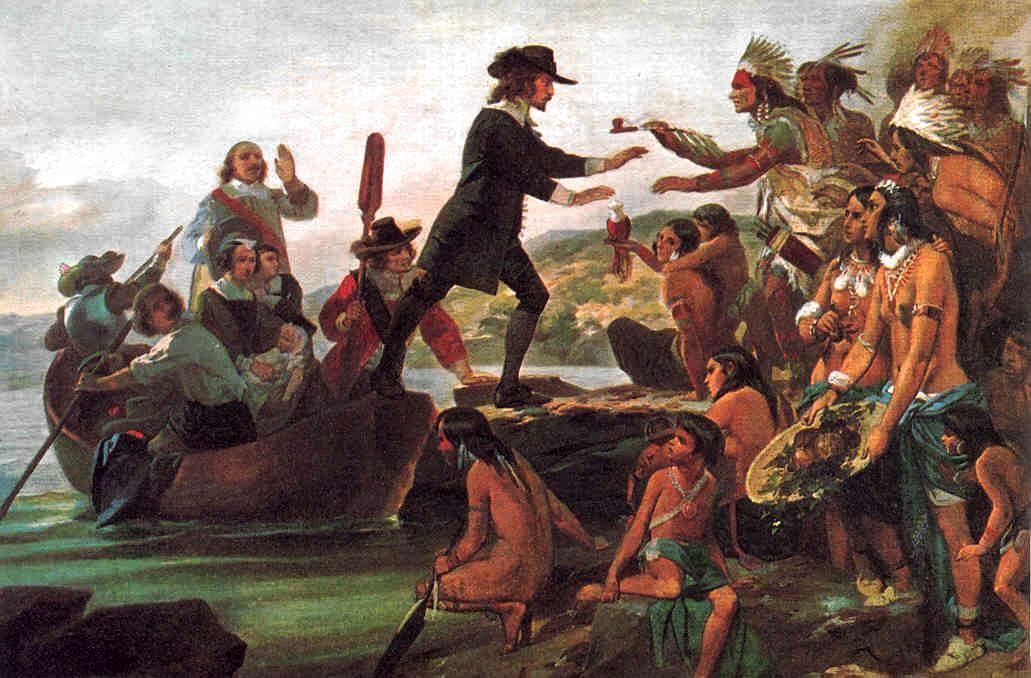
a painting by Alonzo Chappel
Museum of Art, Rhode Island
School of Design
|
Anne Hutchinson
Another of these famous free spirits that the moderns love so much to extol was Anne Hutchinson. She and her husband came to New England in 1634 and she immediately gravitated to the Boston pastor John Cotton, whom she had taken a liking to back when he was a pastor in England. She flattered her way into importance in his eyes – and soon the eyes of others in his church. She gathered a group in her home to discuss his sermons,6 extolling his great virtues in comparison to other pastors, whom she insisted were less worthy of their calls. Soon she was passing judgment on all the leaders of the community, claiming that only Cotton preached a covenant of grace, the rest a covenant of works. Further, she began to claim that she possessed this power of judgment because it was given her by God. She was now posing herself as some kind of prophet, enlightened with spiritual insights permitting her to see into the ministry of others. Eventually she concluded that none of the pastors in the colony (except Cotton) were truly fit to preach the gospel. Thus she found herself – under divine authority, of course – slandering the community's leaders, gathering a rather large party or group increasingly hostile to those leaders – and in general threatening the harmony of the community. This was more than simply exercising free speech. She was therefore called before the Council (1638). Much is made by feminists today that she was under indictment simply because she was a woman daring to challenge the male authorities of the Colony. But let the concluding portion of the trial speak for itself: Mr. Winthrop, Governor. Let us state the case and then we may know what to do. That which is laid to Mrs. Hutchinson's charge is this, that she hath traduced the magistrates and ministers of this jurisdiction, that she hath said the ministers preached a covenant of works and Mr. Cotton a covenant of grace, and that they were not able ministers of the gospel, and she excuses it that she made it a private conference and with a promise of secrecy, ?c. now this is charged upon her, and they therefore sent for her seeing she made it her table talk, and then she said the fear of man was a snare and therefore she would not be affeared of them. ...She took herself and her followers to Williams's Providence Colony. But things did not go well for her in Rhode Island. After her husband died, she moved her family to the Dutch colony of New Netherland (on Long Island) - where in 1643 she and her five children were killed in a local Indian uprising. For someone who was certain that a curse would fall upon the Bay Colony for coming up against her and her prophetic powers to locate the anti-Christ among the authorities of the colony (virtually all the pastors except her beloved Rev. Cotton) it appeared to some at the time that the curse in fact had fallen on her instead.
6Actually holding such discussion in her home was not an uncommon thing among Puritan women, who were actually quite active in forming and leading prayer and discussion groups, ones involving men as well as women. See: Mark A. Noll, A History of Christianity in The United States and Canada (Grand Rapids, MI: William B. Eerdmans, 1992), pp. 60-61. |
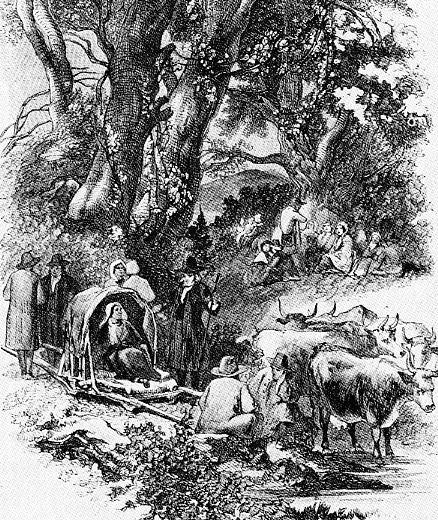
Thomas Hooker and his followers move to Connecticut – 1636
|
Thomas Hooker and the Connecticut Colony
Hooker was another individual who departed from the colony because of disagreements he had with its authorities over key issues. But his departure was deeply mourned by those authorities, for they considered him one of their very best leaders. Nonetheless they granted him his request to depart, seeing it as God's way of extending the Puritan domain. Hooker was undoubtedly the most highly respected and beloved Puritan pastor back in England ... and the most detested by the king and bishops. He was forced to flee the country in 1630, make his way to Holland, and then three years later join his fellow Puritans in Massachusetts. He was immediately given the pulpit in Newe Towne (Cambridge) and became a key voice in the life of the Colony. But he too was bothered by the way religion and politics were bound so closely together in Massachusetts. The colony's officers, both civil and religious (governors, magistrates, pastors, teachers, etc.), were elected only by full members of the Church. Hooker felt strongly however that the elections of civil officers should be open to all citizens, or at least property-holders among them, regardless of their status within the Church. He felt so strongly about this issue – and the Massachusetts officers felt so strongly opposed to his idea – that in 1636 he petitioned the Council and was granted permission to leave the Colony with 100 of his church members to establish a new settlement to the West, at Hartford on the Connecticut River. Here he joined other English settlements at Windsor and Wethersfield, established only a few years earlier along the Connecticut River. In 1637 they combined to fight the Pequot war and in 1639 even formed a joint government, defined in the Fundamental Orders of Connecticut, largely in line with Hooker's philosophy on civil and religious authorities. His influence remained strong however not just in Connecticut but throughout New England. He continued to be very close to both Winthrop in Massachusetts and Williams in Rhode Island, traveled frequently to Boston and to Providence for consultations, and helped create the notion that despite the doctrinal differences among these leaders, they were still closely united in their vision of creating a New Israel in America. In addition to these social and theological issues there were a number of economic issues also at work in the development of the Connecticut colony. The land around Boston was stony and ill-suited for farming. And the population was growing rapidly in the Bay Colony, putting tremendous pressure on the land's ability to support community life. But the land along the Connecticut River was fertile and productive. Thus many Puritans began pouring into the area simply to take advantage of the better soil. And nearby another colony, New Haven, was set up in 1638 by Puritans who began to feel that Winthrop's Bay Colony was not strict enough in enforcing its Calvinist ideals! |
But Hooker held deep feelings that church authority and civil authority should be separate
items ... and moved on to set up his own colony amidst a number of other new and growing
Puritan colonies in Connecticut.

|
John Eliot preaching to the Natick Indians
| It
might be supposed that any troubles that developed with the Indians
would have been over questions of land rights. But actually, the first
conflict which erupted was over trade, compounded by rivalries among
the Indian tribes themselves, and set off by the misadventures of a
handful of English and Indians – which step by step escalated into
full-scale war in 1636.
The Pequot War
Endecott (not only former governor in the early days of the Puritan settlement at Salem but also former soldier), angry over a local murder by some Indians, led a raiding party against the Pequot – who in turn took revenge. This quickly spiraled into massacres of both English and Indian settlements. The worst was the near total slaughter of the Pequot (600 or 700?) at their village at Mystic by a force of English and their Narragansett and Mohegan allies. This attack and several others like it (though of a smaller nature) broke the power of the Pequot. Some of the surviving Pequot escaped to neighboring lands (the Mohawk, however, turned them over to the English as a show of friendship). But most were given to the Narragansetts and Mohegans as slaves or sold as slaves to Bermuda or the West Indies, or even sold to Puritan families in Massachusetts and Connecticut as household slaves. And Pequot land was confiscated by the English. The Pequot were devastated.
John Eliot and the Praying Indians
John Eliot, as minister/teaching elder, was one of the early leaders of the colony (arrived in 1631). He co-edited the Bay Psalm Book (the first book published in the English colonies) in 1640 and set up the Roxbury Latin School in 1645. But his most notable achievement was his missionary work with the Massachusetts Indians. In 1646 the General Court authorized support for a Christian mission to the Indians, and Eliot took the lead in the effort, giving the first sermon that year in the Natick language. His work drew interest back in England and in 1649 the heavily Puritan Long Parliament subscribed 12,000 pounds (silver coinage) toward the mission. He eventually completed a translation of the Bible in the Natick language (1663) and created an Indian grammar book (1666). He also organized the newly converted Indians, called "Praying Indians," into communities along the English frontier (fourteen eventually), the foremost at Natick. But these Indian communities served a political purpose as well – for they acted as a buffer between the English and the more hostile Indians. When however a major English-Indian war finally erupted (1675) the English lost their trust in these Indian allies and confined or resettled them – thus ending the separate status of the Praying Indians. |
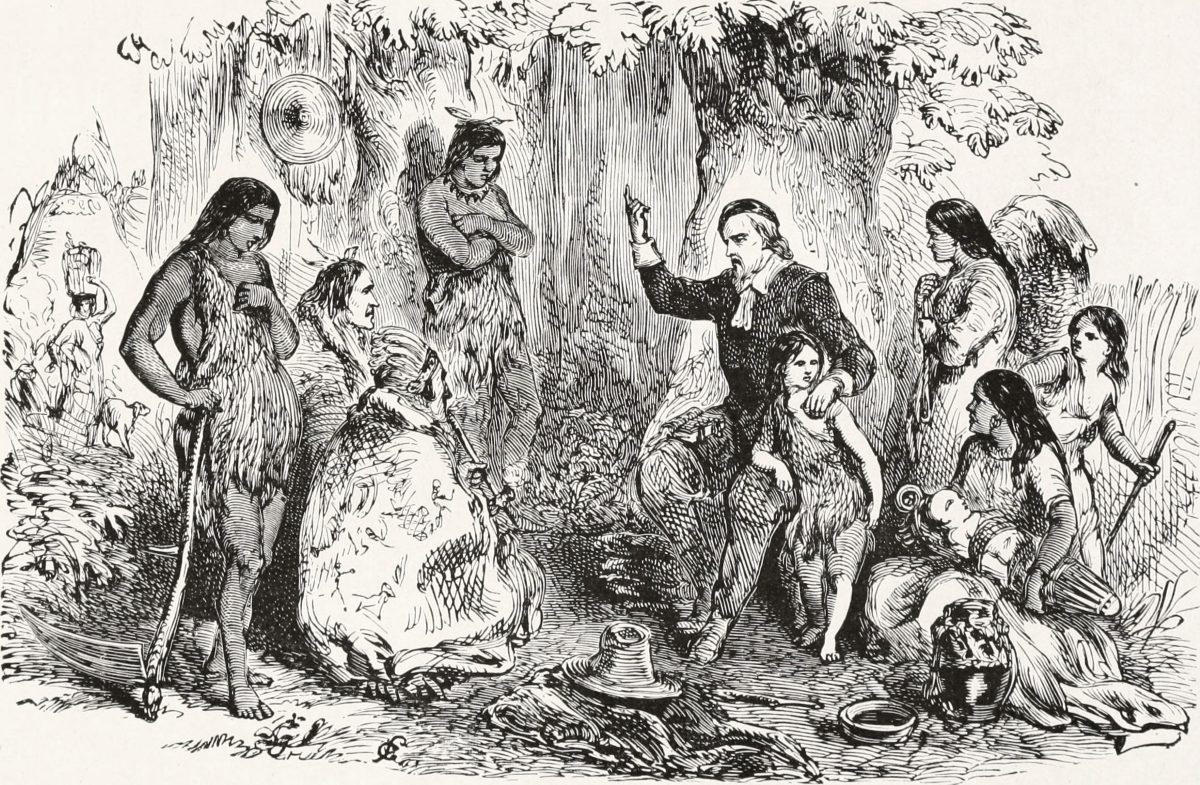
King Philip's War (1675-1676)
In 1675 the very deadliest of all Indian wars in American history erupted – deadliest not because of the sheer numbers involved, but deadliest in terms of the percentages of the inhabitants killed in the fighting. More than half of New England's ninety towns were attacked, almost a thousand English settlers were killed by the Indians, but three times that number of Indians died (mostly of exhaustion and disease) during the Indian uprising. Ultimately the war left the Indian communities in the region totally devastated and the English communities hostile toward – or at least suspicious of – all Indians. When Plymouth's long-time Wampanoag ally Massasoit died in 1661, and his older son died suddenly (and mysteriously – even suspiciously) in Plymouth while there on a diplomatic mission, his second son Metacom (or King Philip to the English) took command of the Wampanoag. But Metacom did not hold the same view of the English that his father had. Metacom began meeting with other tribes to organize a massive surprise attack on all the various English settlements in New England. The Indians were having a hard time with the English. The English had been sending settlements up the rivers and along the coasts, depriving the Indians of some of their best hunting territory. The Indians no longer found in the English presence at least the economic advantage of trade with them for the much-needed tools and weapons the English possessed. The Indians were running out of goods to trade for these English items and were having to resort to the selling of their land instead. Then too the English seemed unable to respect the Indians or their culture, increasingly treating the Indians as pagan children, frustrating and angering the Indians enormously. The situation was thus already very tense when Metacom began to plot this act of Indian reprisal against the English everywhere. The war erupted in gradually growing stages starting with the murder in 1675 of a Praying Indian who had warned the English of Metacom's plans to attack the English settlements. His Indian murderers were captured, tried and hanged – leading to a countering attack on an English settlement by a group of Indians. The violence now escalated quickly. The Indian attacks against various English settlements gathered momentum during the summer and early fall of 1675. In the early winter the colonist militias struck back furiously at the Narragansetts, who had been sheltering Wampanoags. The situation however only worsened for the English settlers as a gathering coalition of Indian tribes raided town after town, even reaching as far into English territory as the Plymouth Plantation. By March of 1676 it looked as if the Indians were unstoppable. They even burned Providence (Rhode Island) to the ground and a large section of Springfield (Massachusetts). But as the war was becoming a war of mutual attrition, it became a question of which side could resupply itself in food and weapons. The Indians were hoping for help from the French. But the help never arrived. Likewise, the English were hoping for help from the Mother country – which also never materialized. But the English were greater in number in the affected areas and better set up to help each other. Also, some of the Indian tribes, such as the fierce Mohawks, actually joined the conflict on the English side. Little by little Metacom and his warriors began to lose ground. They had also missed the growing season that they would need to survive the coming winter and they knew that their situation was growing desperate. Warriors began to drift away from Metacom – especially as the English offered amnesty to Indians who would give up the fight (important because continued fighting was resulting in whole Indian units being surrounded and slaughtered, men, women and children). Metacom now had become a man on the run. In August he was finally tracked down and killed by an Indian who was a member of one of the search parties looking for him. Quickly the whole Indian uprising fizzled out. Many Indians escaped to join other tribes in the neighboring regions. Many others were captured and sold into slavery (mostly in the West Indies). A number of the remaining tribes were virtually eliminated in part by the fighting itself, but even more by the hunger and disease which accompanied the fighting. The English community quickly revived - and found now that it could move westward with less danger coming from hostile Indians. |
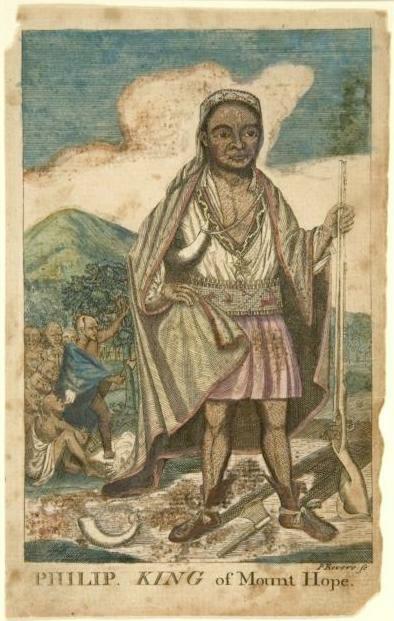
| King Philip led a massive Indian uprising in 1675-1676 ("King Philip's War"). Dozens of towns and villages on both sides were completely destroyed in the fighting and over 1000 Anglos and 3,000 Indians were killed. In the end, the English bounced back from the crisis. But Indian power was deeply shattered in New England |
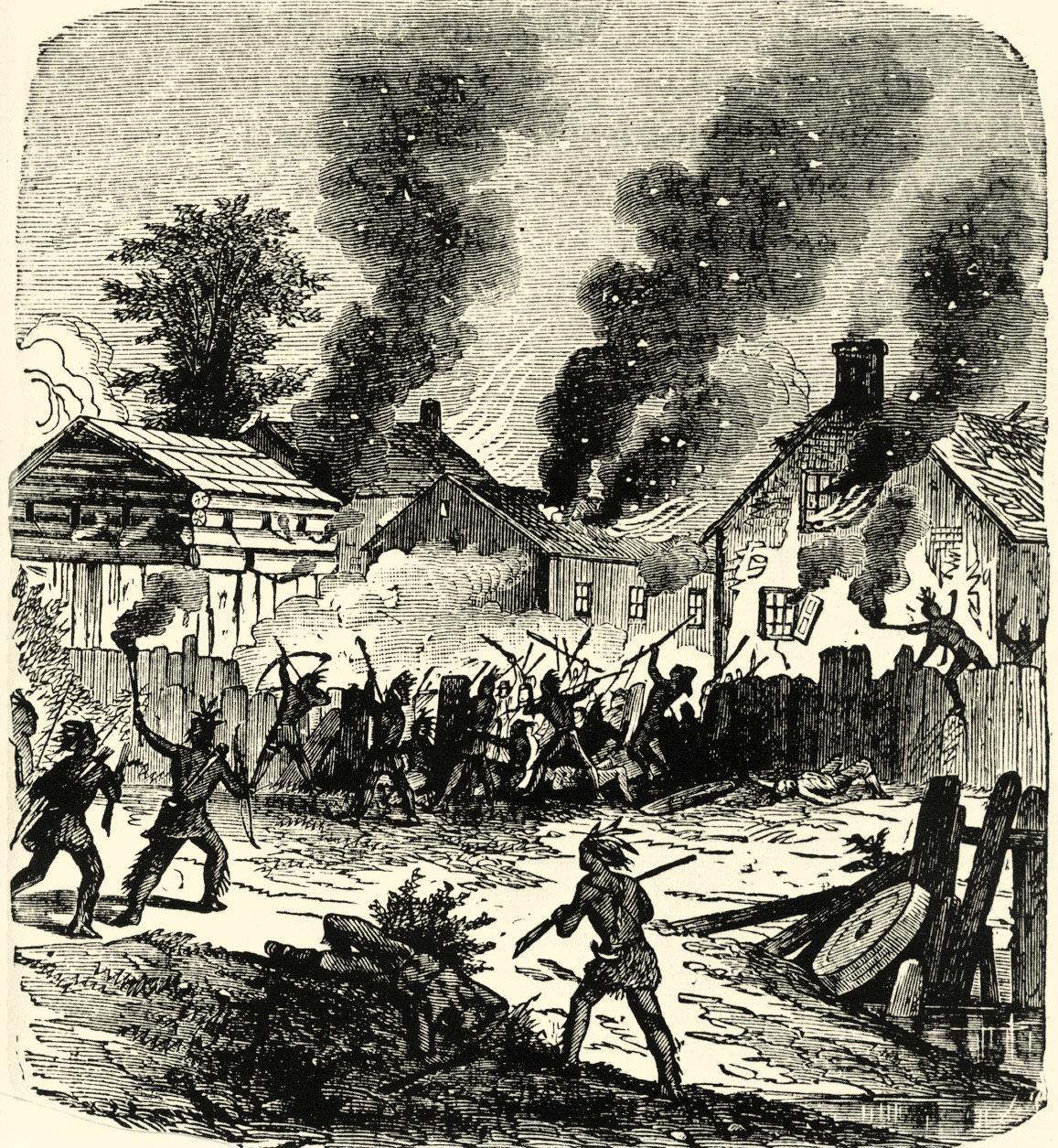
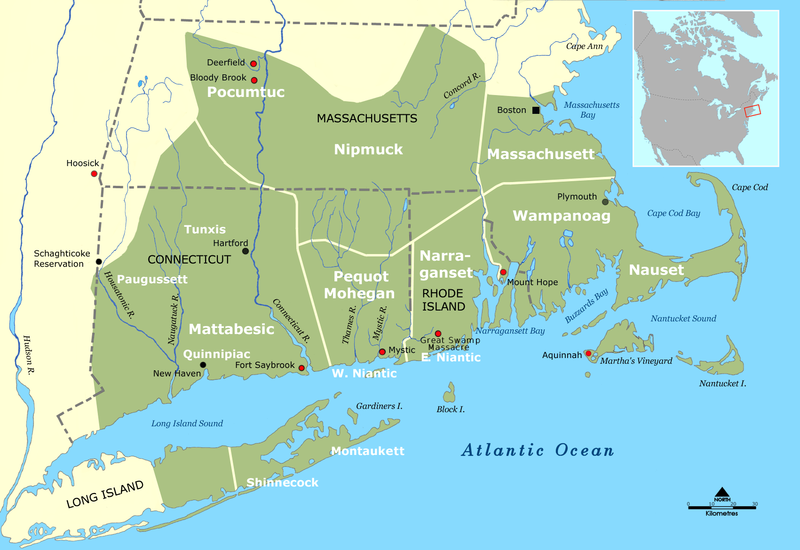
Wikipedia - "Raid on
Deerfield"


 Miles H. Hodges
Miles H. Hodges